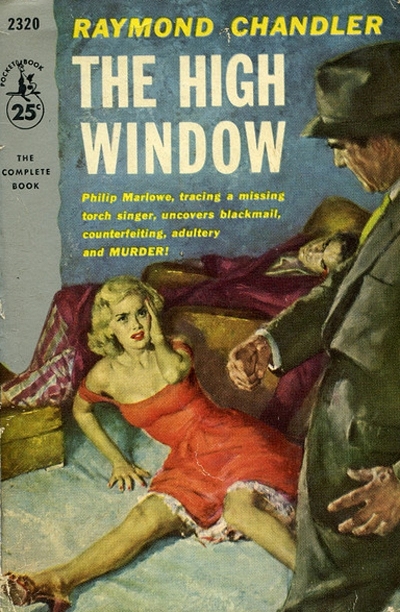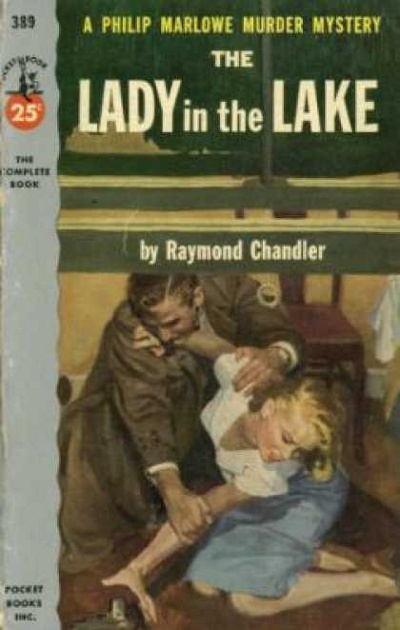|
Pulp Noir - Raymond Chandler's The High Window & The Lady in the Lake

Raymond Chandler's The High
Window was published in 1942. In this story Philip Marlowe is hired by
Elizabeth Bright Murdock to find a valuable coin that has been
plundered from her safe. Mrs Murdock's chief suspicion falls on the
estranged wife of her son, a showgirl who she has never trusted or
liked much.
As ever, Marlowe fearlessly
throws himself into the case but (equally as ever) finds it to be far
more complicated than it appeared on the surface when he was hired in
the first place. Who took the coin? And who exactly is Mrs Murdock
anyway? Is she hiding something?
The High Window lacks the
audacity and freshness of The Big Sleep and Farewell, My Lovely but
it's still a decent enough outing for our very down to earth hero.
There is a palpable weariness to Chandler by now and Marlowe is
becoming rather Holden Caulfield as he rails against the phoney world
he is forced to inhabit. Chandler was drinking a lot again when he
wrote this and booze sodden passages abound.
"Then he picked the glass up and
tasted it and sighed again and shook his head sideways with a half
smile; the way a man does when you give him a drink and he needs it
very badly and it is just right and the first swallow is like a peek
into a cleaner, sunnier, brighter world."
The low rent world that Marlowe
increasingly finds himself in is even more Hellish than usual here and
although the descriptive flourishes and smartarse asides and lines from
the detective are still great ("From thirty feet away she looked like a
lot of class. From ten feet away she looked like something made to be
seen from thirty feet away...") this story doesn't quite live up to
expectations if you are familiar with the first two Chandler Marlowe
books.
The plot this time is propelled
by coincidence and chance and seems to indicate that Chandler was not
quite at the top of his game when he wrote this. There is still a
jaunty and confident quality to the prose but the actual construction
of the story is not as strong. Still a fun book though and Chandler's
dialogue and prose crackles in its best flourishes.

The Lady in the Lake was
published in 1943 and while not regarded to be the best of the Marlowe
books (I think even Chandler said that he didn't enjoy the book much
whenever he picked it up) it's still very readable if you are familiar
with the other stories in this series.
Chandler is becoming almost as
jaundiced and tired as his hero by now and this bitterness gives the
book some extra grit and edge. The story begins with Marlowe being
hired by a man named Derace Kingsley. The private detective is wary
whenever he has a new client but money is money and he has enough
street smarts to be a decent judge of character by now. The fact that
he doesn't trust anyone is a good defence mechanism.
Kingsley is a company director
for a perfume business and wants Marlowe to track down his estranged
wife Crystal. The last that Derace heard from Crystal was when she sent
a telegram declaring that she was about to get married to a man named
Chris Lavery.
The problem is that Lavery, a
gigolo who Kingsley already knows quite well, is currently in Los
Angeles and steadfastly claims to know nothing about Crystal's
whereabouts. Marlowe begins his investigation by questioning Laverly
and then taking a trip to Big Bear Lake where Crystal was last seen in
one of the cabins.
Laverly seems to be on the level
and genuinely innocent of any involvement (although Marlowe doesn't
exactly take a shine to him) so what did happen to Crystal Kingsley?
This could turn out to be the twistiest and most complex case our
downbeat hero has been involved with yet.
The Lady in the Lake is maybe a
bit too complicated for its own good at times but this quality does
help to whip the rug out from under the audience once or twice and I
like the fact that you really have to concentrate to make sense of the
story and the investigation that Marlowe undertakes.
Marlowe, despite his sardonic
assurance, inevitably finds that these cases are far more complicated
than they appeared to be at first glance and is always on the cusp of
being completely in over his head. It gives him a nice everyman quality
and this feels more pronounced in The Lady in the Lake.
I liked some of the Chandler
flourishes too as Marlowe increasingly regards all around him with a
mild distaste and disdain. The perfume business at the start of the
story for example seems to Marlowe (and for Marlowe read Chandler) to
almost be a perfect metaphor for the emptiness and superficiality of
life in the city.
The detective seems to be at his
most misanthropic here and it's as if Chandler was in an especially bad
mood when he wrote this novel - artificial phoniness now almost
more than he can currently stand. Marlowe trusts absolutely no one in
this story and seems to be becoming increasingly desensitised to death
and the more macabre side of his line of work.
This story is not as immediate
as The Big Sleep or Farewell, My Lovely but it does have some great
passages (or Chandlerisms I suppose) and is notable too for taking our
hardboiled hero out of the city for a while. Chandler knew all the
locations in the book, or at least approximations of them, in real life
and seems to enjoy writing about them.
One thing you do notice with
this book is that Marlowe seems to be increasingly centre stage and
although he's a great character one senses that Chandler is
increasingly disinterested in other characters.
It's almost as if he can't be
bothered anymore sometimes (although Chandler was less than impressed
when the film version was constructed in a somewhat bizarre "Marlowe
perspective" as if we were him for the duration of the film). The Lady
in the Lake is flawed but still a lot of fun.
- Jake
c 2016
Alternative 007
|

|


